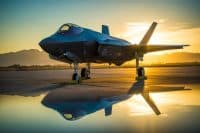This post may contain links from our sponsors and affiliates, and Flywheel Publishing may receive
compensation for actions taken through them.

This is not a big surprise. We noted back in August that a production increase beyond 47 planes per month was likely to be announced by the end of the year. Thursday’s announcement comes a bit earlier than expected is all.
In an investor letter from mid-August, Canaccord Genuity expressed concern that a 737 production rate of more than 50 a month may not be sustainable. And not only for Boeing, but for rival Airbus and its almost certain move to match Boeing’s announcement with one of its own regarding the production rate of its competing A320 aircraft.
John Leahy, who is the chief salesman for Airbus, commented to Aviation Week on the Boeing plan before it was even announced:
Three airlines tell us they’re going to improve their market share by 10-15%. But someone is going to be very successful, someone very unsuccessful and someone in the middle. So two or three don’t need all the planes they ordered. … What worries me is this whole “Field of Dreams” concept: Build it and they will come.
ALSO READ: Boeing’s 20-Year Forecast Tops Airbus
Leahy might consider taking his own advice. Airbus is considering raising its production rate for the A320 from 42 to 50, which Leahy says is no problem currently, but he admits he’s not sure about what demand will be like seven or eight years in the future.
For its part, Boeing’s marketing vice-president for commercial aircraft said, “Our thorough analysis tells us the single-aisle market continues to expand and is the fastest growing, most dynamic segment of the market.” Boeing has projected a requirement for 25,000 single-aisle planes like the 737 and A320 over the next 20 years. Airbus estimates demand for the narrow-body planes at around 22,000 for the same 20-year period.
UBS analysts anticipate a rough balance of supply and demand for narrow-body planes until 2018. At 52 per month for the 737 and a potential 50 per month for the A320, the two companies will build 1,224 narrow-body planes, well above the total 1,019 delivery forecast from UBS for 2018.
The other thing to keep in mind about aircraft purchases is that easy financing in the past couple of years has been a key to sales growth. Another driver has been high fuel prices. We noted the recent drop in jet fuel prices, and if low prices show signs of sticking, orders for more fuel-efficient planes could be cancelled.
Boeing’s shares traded down about 0.2% in the early afternoon on Thursday, at $124.38 in a 52-week range of $113.34 to $144.57. Volume was light though on another down day for the market.
ALSO READ: Why a Boeing 737 MAX Costs up to $113 Million
Get Ready To Retire (Sponsored)
Start by taking a quick retirement quiz from SmartAsset that will match you with up to 3 financial advisors that serve your area and beyond in 5 minutes, or less.
Each advisor has been vetted by SmartAsset and is held to a fiduciary standard to act in your best interests.
Here’s how it works:
1. Answer SmartAsset advisor match quiz
2. Review your pre-screened matches at your leisure. Check out the advisors’ profiles.
3. Speak with advisors at no cost to you. Have an introductory call on the phone or introduction in person and choose whom to work with in the future
Get started right here.
Thank you for reading! Have some feedback for us?
Contact the 24/7 Wall St. editorial team.



